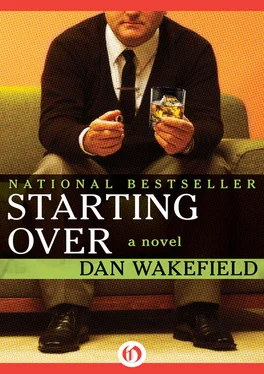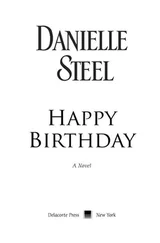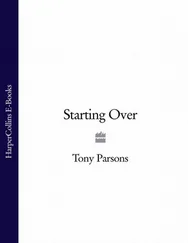When she came home she found him in his underwear guzzling from the bottle, glassy-eyed, and when she asked what had happened he explained, “I quit.”
For a while she tried to reason with him, told him how that sort of thing happened all the time to everyone, tried to taunt him, appeal to his machismo, but finally she understood that something had clicked off, that indeed the big theatre dream was as busted inside him as a pricked balloon, and that nothing could patch it together and blow it up again; and when she was sure of that she set down her cup of Medaglia d’Oro and lit a Pall Mall, and after exhaling a long, thin stream of smoke, like a line drawn across the empty air, she said in a calm, thoughtful voice: “You’ll be drunk tonight. And puking in the morning. When you’re through, get your shit together and clear the fuck out.”
Potter said nothing.
Thinking back, he wished he’d had some kind of line of farewell. He at least could have done a quick buck-and-wing and said “Remember me to Herald Square.”
The old saw that “those who can, do; those who can’t, teach” was part of the vague prejudice Potter had carried with him against the academic life, but that seemed no more applicable now than many of the other set assumptions he had grown up with in the Fifties. Teaching had the potential for the sort of personal satisfaction that people seemed to value more now than old-fashioned success, and Potter was willing to give it a fling if any institution was bold enough to grant him the chance. Knowing the market was already glutted with Ph.D.s, he couldn’t imagine that his own academic background, which sported nothing gaudier than the now perfunctory B.A., would qualify him for anything. But Max Bertelsen, who knew what was happening, said that Potter’s practical experience might just be of interest to certain institutions whose programs were now in flux.
Gilpen Junior College was in flux.
It was one of the many brownstone schools of higher education on Beacon Street, former family houses converted into factories of learning, ranging from certified distinction of a minor sort to high-priced havens for middle-class kids who had nowhere else to go, were not yet ready or willing to marry or work, and whose parents could afford the luxury of a largish tuition in exchange for the solace of saying “My son/daughter is at Gilpen Junior—you know, in Boston.” This college, as well as many others scattered through the metropolitan area, had flourished for a while with fairly staple servings of a liberal arts stew, and a boast of being small, selective, and “giving special attention to the individual student.” But along with many other private colleges, Gilpen had felt the pinch caused by the end of the postwar baby boom, rising costs, the growth of state institutions with vastly lower tuitions, and had brought in a new dean who was a real live wire to revolutionize its program to meet current needs and trends.
As Dean Guy M. Hardy, Jr., explained it, “The day of the Ivory Tower is past. In fact, ‘the past’ is past. What’s happening is Now, in education as in other fields.”
Dean Hardy tamped his meerschaum and his brow furrowed in studied seriousness. His greying hair was styled in a brush-cut, and with his snapping little eyes and pudgy, lineless pale moon face, he reminded Potter of an apprentice FBI agent. Actually, he had “been in government” before going into higher education. From the way Hardy spoke of “being in government” it sounded as if he had probably held some sensitive post pretty high up in State, but Potter knew from Max Bertelsen that Guy Hardy had served in the nether regions of the USIA, editing a quarterly designed to capture the minds of the intellectuals in Central America and producing a series of Brief Lives of American Presidents for Radio Free Europe. He had also seen overseas duty, holding down the post of librarian at the American consulate in San Salvador for eighteen months.
“The world is changing, and with it, education,” Hardy continued.
Potter tried to concentrate.
He gathered that Dean Hardy had been sucking around the Harvard Crowd, and had through some such connection gained entrée to the Bertelsen salon. That was big potatoes in the Boston-Cambridge intellectual circuit, and Potter understood clearly the reason he had been granted the interview was because of high recommendations from Max.
“So we stress,” said Hardy, “Communications. We do not have ‘Freshman English’ as such, but a wide-ranging course of study designed to meet the needs of students growing up into one of the most media-oriented societies known to man.” He paused, proudly, and said, “We call this core, required line of study ‘Contemporary Communications in a Media-Oriented Society.’”
“Very apt,” said Potter.
“Or,” Hardy chuckled, “as the students call it, ‘Con Com.’”
Potter smiled.
“Max tells me you’ve done quite well in public relations. What brings you to consider leaving the field?”
Potter got out a cigarette, paused, and sizing up his audience in the way that he would a prospective client, proceeded artfully to feed the Dean every cliché he figured he would gobble up, all covered with a thick sauce of sincerity. When he finished, Hardy was clearly impressed, and said he liked the idea of having some faculty who had come by their experience “in the real world of push and shove.”
“I can honestly say,” Potter said with a grin of camaraderie, as if sharing a personal insight with a man of the world who would understand, “I’ve done my share of pushing and shoving.”
Hardy winked, and nodded. He offered Potter a position as instructor, teaching two sections of Con Com—and a prize!—a seminar in public relations.
For that one, Potter mused, he could take the class to lunch, have each student drink four martinis and abstain from any food; the ones who could return and work until five would pass the course. After the interview, Potter walked down Beacon Street and into the Public Gardens, where he sat on a bench, feeling expansive and excited, looking around at this curious old-new city, seeing it now not just with the appreciative eyes of the tourist but the proprietary feeling of a soon-to-be citizen of the place. It was the way he once felt when he was new to New York, sitting on a bench in Washington Square.
Trees and grass.
Grass and trees.
Potter rented a ground-floor apartment in an old frame house on a quiet street in Cambridge where traffic jams of contentious taxis and demolition crews from Con Edison seemed as unlikely as cattle stampedes. He figured as long as he was fleeing New York he might as well get as far away from its spirit as possible, and so chose to live across the river from Boston in the more pastoral, less-citified world of Cambridge. It was only a ten minute commute by subway, and the subway itself was a joyride compared to the roaring, rocking, hellbent human cattlecars that blasted back and forth beneath the boroughs of New York in their underground chambers filled with pestilent air and ages of grime. The subways Potter took to Boston from Harvard Square were brightly-painted trolley-type cars that reminded him of childhood and a less frantic era. And, in what Potter considered an extra dividend of the trip, the trains clanged up from underground to cross the Charles River on a bridge that provided the passengers a sudden, sun-glinted view of water and sailboats, skyline and sky.
Potter sat at his bowed-out living room window with a glass of instant iced tea, just looking at the green, luxuriating in the sight, devouring it, letting it feed him. It was one of the important factors in making his move, and it helped him to view it as rational and right. He felt the presence of grass and trees might even make him drink less. Bring order. In New York you had to drink just to clear the soot from your throat. Burn off the grime. In New York you had to drink for your goddamn health. Or your job. Just by leaving his PR job, Potter had eliminated all the expense account luncheons with three martinis and a brandy for dessert, and all the freebie cocktail parties after work. He vowed not to drink in the daytime anymore, and figured that ought to be easy since there wasn’t any reason for it now. That was certainly a plus for his change; in fact, almost everything he could think of about his new move was a plus except for a considerable cut in salary, but in its own way he looked on that, too, as a healthy change. It would be good to live frugally for a while, help in his desire to simplify and purify his manner of existence.
Читать дальше












